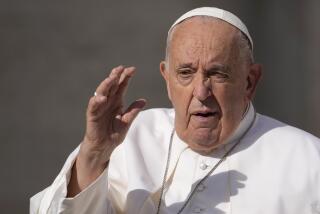Vatican Says Feminism Is Undermining the Family
- Share via
VATICAN CITY — The Vatican on Saturday denounced feminism, saying it attempts to blur differences between men and women and threatens the “natural two-parent structure” of the family.
The drive for equality, the Vatican said, makes “homosexuality and heterosexuality virtually equivalent, in a new model of polymorphous sexuality.”
The concerns, raised in a 37-page document written by one of Pope John Paul II’s closest aides, also outlined the Vatican’s own formula for relations between men and women, calling for “active collaboration between the sexes” and rejecting subjugation of women.
Stating that women should not be stigmatized or penalized financially for wanting to be homemakers, it also said women “should be present in the world of work and ... have access to positions of responsibility which allow them to inspire the politics of nations and to promote innovative solutions to economic and social problems.”
The statement, approved by the pontiff, was the latest Vatican salvo against trends it regards as undermining its teachings on sexuality and the family. Vatican officials have assailed abortion and contraception; politicians who support abortion rights; and legalization of same-sex unions.
Archbishop Angelo Amato, secretary of the Congregation for the Doctrine of the Faith, said Saturday on Vatican Radio that the aim of the letter was to critique two current strands in feminism: one that emphasizes “a radical rivalry between the sexes” and the other that seeks to “cancel the differences between the sexes.”
Elisabeth Schussler Fiorenza, a theologian at Harvard Divinity School, said the document restated positions the Vatican has taken many times and the only surprise was its timing. She said church leaders may be feeling some urgency to combat same-sex marriage, as well as renewed pressure to consider ordaining women in response to the worldwide scandal over sexual abuse by priests.
“It has some positive things in it, but the political function of the document is the same as the ones before,” Schussler Fiorenza said.
“It’s trying to make a theological case, which they’re really not able to make, against the full equality of women in the church.”
More to Read
Sign up for Essential California
The most important California stories and recommendations in your inbox every morning.
You may occasionally receive promotional content from the Los Angeles Times.













